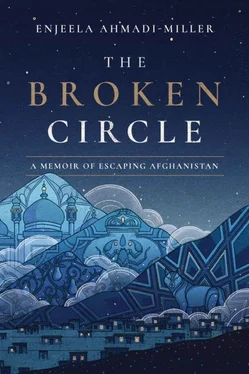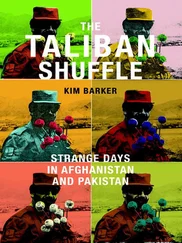We trudged in a group through the mountain pass that was strewn with huge boulders and dirt. We had to weave our way through the debris, straddling rocks and loose dirt, slipping between larger boulders, until it was too dark to continue safely. Masood found a safe spot up on a mountain slope, and we sat close to each other in the dirt. Some of the other bus passengers stopped with us; others disappeared into the darkness, continuing their journey up the road. I sat close to Masood, and he made himself comfortable in the dirt as best he could. He rummaged in his knapsack and pulled out an apple. Then, from under his cloak, he unsheathed a large, shiny hunting knife. I’d never seen such a large knife before. He carefully peeled the apple with the sharp blade, then cut it into pieces, handing out some to each of us. My sisters and Zia sat close by, and we ate in silence. Masood cut more fruit for us and passed around a bottle of water and told us not to drink too much; we would have to save some for the long walk tomorrow.
It had been a long day—woken suddenly from my comfortable bed and now bedding down right in the hard dirt on a hillside. I was exhausted and tried to make the best of it. My sisters and Zia settled down, and in minutes it seemed I could hear them sleeping soundly. I lay awake, staring up at the Afghan sky. The stars above sparkled—brilliant in the night sky, beautiful and large. In one day I’d been thrust out from my home into a wilderness, and all the light I had were these stars, surrounded by quiet. The sound of bombing that we heard every night didn’t reach this isolated patch of earth. My thoughts ran everywhere, wondering where we were going and if we’d even get there. I was too fatigued to think about how hungry I was.
“Are you having trouble sleeping?” Masood said quietly.
He sat nearby in the same position, sitting up with his arms around his legs, since we had finished eating. He hadn’t moved.
“Yes,” I said. The air had cooled off, and I felt a chill.
He took off his long cape and laid it over me. When he leaned over, I could see guns strapped across his chest, a pistol in his belt, and his hunting knife strapped to his leg. “You were a little lion today,” he said. “I’m so proud of you. Now sleep. Tomorrow we will walk far.”
He settled into his sitting position, legs against his chest, arms around them, holding them close. I couldn’t even tell that he was breathing. He never closed his eyes. His words warmed me— a little lion. I drifted off under the starry night.
Deep into the morning, I remember tossing and turning. It seemed like minutes later Masood was shaking me awake. “Get up. We have a long way to go today.”
We all rose, and Masood handed out more apple slices. He took his cape back and wrapped it around himself, concealing the weapons strapped against his large torso. The other bus passengers had already left; it was just four kids and Masood. Once everyone was standing, we set off, following Masood’s path as the sun rose.
The farther we walked, the thirstier we became. Hunger and thirst weren’t feelings I was used to. He pushed us all day. When I told him how tired I was, he would tell me just a little farther. “We can rest up there.” He would point to something up ahead, but we never stopped there.
Late in the day, the road dipped down alongside a river, but still there was a twenty-foot drop-off to the river’s edge. We were all thirsty, but it was too far to jump down, and even if we had, the wall was too steep to climb back up to the road.
“Look there,” I said, pointing to a tire floating in the river. Someone had anchored the tire in the river and attached a rope to it, which was tied to a nearby tree. I climbed down the rope. One by one, everyone followed until we were all by the shallow river bank. We cleaned up; washed our faces, hands, and arms in the cold water; and drank as much as we could. It was a relief from the brutal trek, and we all relaxed in the moment of rest.
We were having a great time until Masood shouted, “Tanks are coming! Get in the water!”
Masood hated and feared the Russians and didn’t want to be seen on the road when they passed. We jumped into the water and held on to the tire that kept us from being swept away with the current. None of us knew how to swim except for Zia. The river rushed swiftly around us, swirling and pushing against us. Masood submerged his head, and we all did likewise. We could feel the vibrations of the tanks rolling by in a long line. I had to come up for air a few times, as did everyone else. When we didn’t hear them any longer, we waded into shore. Dust clouds from the passing tanks lingered in the air, leaving a fine patina of dust over us. We stood on the shore for a few moments catching our breath. This was not going to be an easy walk through the countryside. Every day we were going to confront life-and-death situations. This wasn’t a game we would be able to talk our way out of as I had on the bus. There was going to be hiding and running and being afraid and not being afraid. When Masood said it was time, we silently climbed up to the road to continue on.
Our walk lasted several days. Masood would let us stop only every couple of hours. We ate sparingly along the way: slices of apples, dried fruit, a tough brown bread, and water. The travel was exhausting, and we’d slump to the ground at each break to rest our legs. We slept in the open on the side of the road. I had never done that before and neither had my sisters or brother. I never thought I’d enjoy seeing the stars, so vivid and bright in the sky, millions of speckled worlds spinning around me in the night. I had spent my whole life, as much as I remembered, being taken care of by Noor. If we needed to eat, he fed us; if we ran out of food in the house, he went to the market. If we made a mess, one of the maids would clean it up. If our clothes were dirty, we changed into clean ones—washed, ironed, and hung up for us, ready to wear. Now for three straight nights, we had slept on the cold earth, worn the same clothes, and ate apples and pears and rough bread that Masood pulled from his bag. My new tennis shoes, white and shiny just three days ago, now looked like I’d worn them for years. The cracks were filled with dirt, the porous soles were caked with dirt, and the laces had turned a dirty brown. I missed Noor and the house on Shura Street and Padar.
When we arrived in the first village, our resting spot was nothing more than a cluster of mud-brick compounds, behind which we could see the thatched roofs of tiny houses. These small compounds were clustered along a dusty street that ran down the middle of the community, emptying into a small square. There was a uniform brown dullness to the buildings. As nondescript and rustic as the place appeared to us, Masood assured us we would find what we wanted most here: a place to sleep, something nice to eat, and water to wash. Cows, chickens, and sheep were everywhere along the lane. I was so hungry; if I had had the energy to catch one of them, I would have wrung its neck like I’d seen done and begun feasting on it there in the middle of the street. We slumped to the dusty ground in exhaustion while Masood talked to one of the villagers, who agreed to feed us and give us a place to sleep. He motioned us toward an outdoor cooking stove, and we watched a few village women cook rice and vegetables. The women looked like they wore the same clothes they slept in, faded gray chadors and baggy kameez . When the food was ready, they placed the meal on a large platter and gave us each a little plate with a small serving while they began sharing what was left on the platter. They didn’t give us forks or spoons. We all watched the villagers for a while as they ate with their hands. We had never eaten with our hands before, but when hunger claws at you till you think it is going to burst you open, it is not too hard to pick up the rice with your fingers and stuff it in your mouth. I ate with my fingers, as the villagers did and as I’d seen my countrymen do before, and it was the best rice and vegetables I’d ever had.
Читать дальше












